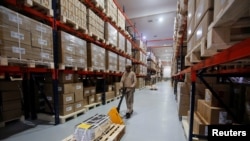A spike in prices of pharmaceutical ingredients in the wake of the coronavirus outbreak in China is impacting Indian drugmakers and has raised concerns about the vulnerability of one of the world’s major producers and exporters of generic drugs to shortages.
The Indian drug industry imports nearly 70 per cent of raw pharmaceutical ingredients from China.
While big companies have said they have enough stock to last them for about two months, smaller manufacturers have been hit by price hikes.
“Paracetamol was Rs 275 (about $ 4) about one month or six weeks back. It has gone up to Rs. 450 ($ 6.3) a kilogram,” according to T. Srikrishna, the chief executive officer at Low Cost Standard Therapeutics, a not-for-profit generic drug manufacturer in Gujarat. “Anything which has got a link to China has been affected.”
Supply chain disruptions are also a cause of major worry. Amid efforts to limit the spread of the deadly coronavirus outbreak, factories in China have been impacted and supply lines affected. Hubei province, where the virus originated, is a production hub for pharmaceutical ingredients.
“Since half the world’s manufacturers are all relying on active ingredients coming from the Chinese manufacturers, there can be severe problems more downstream and later in the year specially when it comes to niche products that are manufactured at very few manufacturing sites in the world,” according to Jayasree Iyer, executive director at the Netherlands-based Access to Medicine Foundation, a non-profit organization that analyses the world's largest pharmaceutical companies.
Among the drugs that could be affected are antibiotics and vitamins, she said. India is one of the world’s main producers of affordable medicines.
While some stocks are being airlifted from China, drugmakers face uncertainty about when shipments will arrive, according to Deepnath Chowdhury, former president of the Indian Drug Manufacturers Association.
“Logistic problems are there,” he says. “Once sea shipments will start coming, then only things will be easier.”
He says fortunately most of the bigger drug companies had stocked up before the Chinese New Year as per usual practice.
However smaller drugmakers, who do not import directly but procure in smaller quantities from local distributors are grappling with higher costs. According to Rahul Soni of Overseas Healthcare in the northern city of Jalandhar, “My inventory is not going to last for long and that is what worries us today. Some things I am already buying at a premium of 40 to 50 per cent. ” The price of azithromycin, an antibiotic for example, he says has risen by 50 per cent since January.
India’s thriving pharmaceutical industry is the world’s third largest producer of drugs in terms of volume and a major exporter of generic drugs.
But as the coronavirus outbreak turns the spotlight on the reliance of India’s thriving drug industry on China, the Confederation of Indian Industry has recommended that the country needs to build manufacturing capacities to strengthen domestic production of active pharmaceutical ingredients.
Iyer says drug companies should explore dual sourcing and cut down dependence on manufacturers in one country.
Smaller drug makers meanwhile worry about keeping their production lines viable due to the rising prices of raw ingredients. Many of them make basic medicines needed for primary health care such as antibiotics and vitamins.
While the rising costs do not impact retail consumers because prices of essential medicines in India are regulated by the government, Srikrishna says smaller manufacturers will have to simply stop producing if it is not viable.
“If I cant afford to manufacture within that price limit, then I will stop manufacturing it. So shortages could come at a later stage. Now whatever is in the pipeline is being supplied,” he says.
The coronavirus outbreak has infected more than 75,000 people in about 40 countries around the world, most of them in China. The death toll has climbed to more than 2,700.




